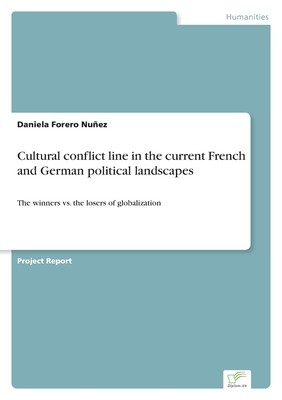
- We will send in 10–14 business days.
- Author: Daniela Forero Nuñez
- Publisher: Diplom.de
- ISBN-10: 3961169586
- ISBN-13: 9783961169580
- Format: 14.8 x 21 x 0.2 cm, minkšti viršeliai
- Language: English
- SAVE -10% with code: EXTRA
Cultural conflict line in the current French and German political landscapes (e-book) (used book) | bookbook.eu
Reviews
Description
The so-called social individualization shaped sociological discourse, especially in Germany, until the 1980s, challenging the previous conception of a rather static social structure, predetermined by class and status. Recently, in view of the increasing social inequalities in western societies, concepts like class and cleavage seem to reappear in the debate. The reincarnation of class in post-modern societies makes room for diametral opposite living environments and lifestyles hard to reconcile with each other. Moving to the political dimension, the concept of cleavage1 links individual political values and beliefs with macro-institutional aspects of political systems, enriching thus the debate on how political parties mobilize particular social groups. Given that this development concerns several western societies, a row of terms has emerged to illustrate this phenomenon in different national contexts. Western European political systems have responded to the increasing relevance of the cultural dimension and have reconfigured themselves, giving birth to and consolidating right-populist parties since the 2010s. Globalization has further accentuated this cultural conflict line, making room for fully antagonistic views on cultural issues, such as immigration. Hence, political parties have turned into agents of the political-cultural ressentiment resulting from globalization, or have moved towards more progressive political agendas, appealing to those generally profiting from a changing world. Assuming that this phenomenon responds to a transformation of the social structure beyond national borders and applies therefore to the selected cases of study, the present paper aims to analyze whether there are any significant national differences between the French and German right-populist parties Rassemblement National and the Alternative für Deutschland and the new- left parties La République en Marche and Bündnis 90/Die Grünen in their approving or disapproving positioning
EXTRA 10 % discount with code: EXTRA
The promotion ends in 23d.01:28:43
The discount code is valid when purchasing from 10 €. Discounts do not stack.
- Author: Daniela Forero Nuñez
- Publisher: Diplom.de
- ISBN-10: 3961169586
- ISBN-13: 9783961169580
- Format: 14.8 x 21 x 0.2 cm, minkšti viršeliai
- Language: English English
The so-called social individualization shaped sociological discourse, especially in Germany, until the 1980s, challenging the previous conception of a rather static social structure, predetermined by class and status. Recently, in view of the increasing social inequalities in western societies, concepts like class and cleavage seem to reappear in the debate. The reincarnation of class in post-modern societies makes room for diametral opposite living environments and lifestyles hard to reconcile with each other. Moving to the political dimension, the concept of cleavage1 links individual political values and beliefs with macro-institutional aspects of political systems, enriching thus the debate on how political parties mobilize particular social groups. Given that this development concerns several western societies, a row of terms has emerged to illustrate this phenomenon in different national contexts. Western European political systems have responded to the increasing relevance of the cultural dimension and have reconfigured themselves, giving birth to and consolidating right-populist parties since the 2010s. Globalization has further accentuated this cultural conflict line, making room for fully antagonistic views on cultural issues, such as immigration. Hence, political parties have turned into agents of the political-cultural ressentiment resulting from globalization, or have moved towards more progressive political agendas, appealing to those generally profiting from a changing world. Assuming that this phenomenon responds to a transformation of the social structure beyond national borders and applies therefore to the selected cases of study, the present paper aims to analyze whether there are any significant national differences between the French and German right-populist parties Rassemblement National and the Alternative für Deutschland and the new- left parties La République en Marche and Bündnis 90/Die Grünen in their approving or disapproving positioning


Reviews